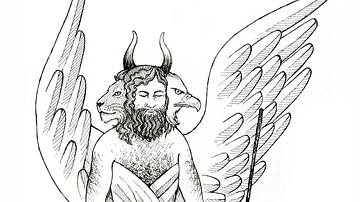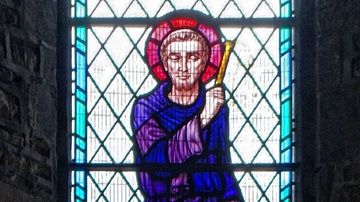Search
Did you mean: Shinto?
Search Results

Definition
Cherub
A cherub (pl. cherubim) was a divine being who dwelt in the heavenly realm of the gods, either as a servant or a mediator between humans and the divine. The word most likely derived from the Akkadian karabu ("to bless"). The cherubim are...

Definition
Pietro Perugino
Pietro Perugino (c. 1450-1523), real name Pietro di Cristoforo Vannucci, was an Italian Renaissance artist who created frescoes for the Vatican's Sistine Chapel and was in demand across Italy to decorate church interiors and produce portraits...

Definition
Hill of Tara
The Hill of Tara is an ancient Neolithic Age site in County Meath, Ireland. It was known as the seat of the High Kings of Ireland, the site of coronations, a place of assembly for the enacting and reading of laws, and for religious festivals...

Definition
Guthlac of Crowland
Guthlac of Crowland (c. 674 - 11 April 714 CE) was an Anglo-Saxon saint from the Kingdom of Mercia. He is best known for his years spent as a hermit in the Fens region of the East Midlands. Guthlac was born into a noble Mercian family and...

Definition
Andreas Karlstadt
Andreas Karlstadt (also given as Carlstadt, l. 1486-1541) was a reformer, theologian, and early supporter of Martin Luther (l. 1483-1546) in the movement that became known as the Protestant Reformation. Karlstadt was one of Luther's most...

Definition
John Alden
John Alden (l. c. 1598-1687 CE) was a member of the crew of the Mayflower, serving as the ship's cooper (barrel maker), on the historic voyage of 1620 CE which established the Plymouth Colony in Massachusetts, North America. Although he was...

Article
Twelve Famous Women of the Middle Ages
Women in the Middle Ages were frequently characterized as second-class citizens by the Church and the patriarchal aristocracy. Women's status was somewhat elevated in the High and Late Middle Ages by the cult of the Virgin Mary and courtly...

Article
The Spread of Islam in Ancient Africa
Following the conquest of North Africa by Muslim Arabs in the 7th century CE, Islam spread throughout West Africa via merchants, traders, scholars, and missionaries, that is largely through peaceful means whereby African rulers either tolerated...

Article
Holidays in the Elizabethan Era
During the Elizabethan Era (1558-1603 CE), people of all classes greatly looked forward to the many holidays and festivals on offer throughout the year. The vast majority of public holidays were also religious commemorations, and attendance...

Article
The Stained Glass Windows of Chartres Cathedral
The 167 stained glass windows of Chartres Cathedral, built 1190-1220 CE, are the most complete group surviving anywhere from the Middle Ages. Several windows date to the mid-12th century CE while over 150 survive from the early 13th century...